
The Parliament of the Democratic Socialist Republic of Sri Lanka is the supreme legislative body of Sri Lanka. It alone possesses legislative supremacy and thereby ultimate power over all other political bodies in the island. It is modeled after the British Parliament.

The State Council of Ceylon was the unicameral legislature for Ceylon, established in 1931 by the Donoughmore Constitution. The State Council gave universal adult franchise to the people of the colony for the first time. It replaced the Legislative Council of Ceylon, the colony's original legislative body.

Ganapathipillai Gangaser Ponnambalam was a Ceylon Tamil lawyer, politician and cabinet minister. He was the founder and leader of the All Ceylon Tamil Congress (ACTC), the first political party to represent the Ceylon Tamils.
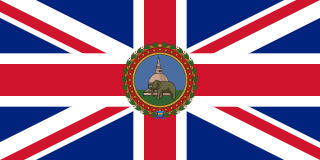
The governor of Ceylon was the representative in Ceylon of the British Crown from 1795 to 1948. In this capacity, the governor was president of the Executive Council and Commander-in-Chief of the British Forces in Ceylon. The governor was the head of the British colonial administration in Ceylon, reporting to the Colonial Office.

Dr. Cristopher William Wijekoon Kannangara was a Sri Lankan Lawyer and a politician. He rose up the ranks of Sri Lanka's movement for independence in the early part of the 20th century. As a lawyer he defended the detainees that were imprisoned during the Riots of 1915, many of whom were the emerging leaders of the independence movement. In 1931, he became the President of Ceylon National Congress, the forerunner to the United National Party. Later, he became the first Minister of Education in the State Council of Ceylon, and was instrumental in introducing extensive reforms to the country's education system that opened up education to children from all levels of society.
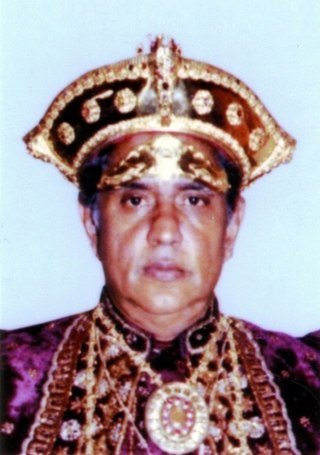
Deshamanya Nissanka Parakrama Wijeyeratne, known as Nissanka Wijeyeratne, was a Sri Lankan politician, civil servant, diplomat and English language poet. He was also the Diyawadana Nilame of the Sri Dalada Maligawa, Kandy from 1975 to 1985. At the time of death he was serving as the chairman of The Law and Society Trust in Sri Lanka.
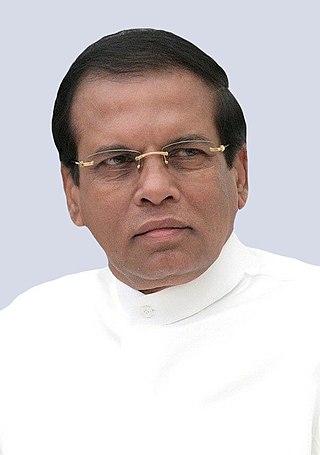
Maithripala Yapa Sirisena is a Sri Lankan politician who served as the seventh President of Sri Lanka from 9 January 2015 to 18 November 2019. Sirisena is Sri Lanka's first president from the North Central Province of the country and does not belong to the traditional Sri Lankan political elite. He is currently a member of parliament from Polonnaruwa.
The Executive Council of Ceylon was the executive council created in Ceylon by the British colonial administration on the recommendations of the Colebrooke-Cameron Commission along with the Legislative Council of Ceylon in March 1833.
Theodore Braybrooke Panabokke was Sri Lankan politician, lawyer and diplomat. He was a former Parliamentary Secretary of Agriculture, Member of Parliament and Ceylon's High Commissioner to India. He was the Chancellor of the University of Peradeniya.

Dr.Akalanka Buddhika Uditha Dedduwa Pathirana who was a Deputy Minister of Ministry of Industry and Commerce කර්මාන්ත හා වාණිජ කටයුතු in Sri Lanka and a Member of the 7th Parliament of Sri Lanka represented the United National Party (UNP), for Matara District. He was elected to the Parliament at the General Election held on 8 April 2010 winning the second highest percentage of votes from the United National Party which is the major opposition in the country.
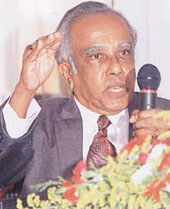
Clifford Senaka Ratwatte was a Sri Lankan politician. He was a former Parliamentary Secretary to the Minister of Agriculture, Food, Co-operatives and Fisheries in 1964 Member of Parliament for Balangoda, Chairman of the State Plantations Corporation and the Sri Lanka Tea Board.
Provincial governments of Sri Lanka are the devolved governments of the nine Provinces of Sri Lanka. In accordance with the Sri Lankan constitution, provinces have legislative power over a variety of matters including agriculture, education, health, housing, local government, planning, road transport and social services. The constitution also gives them powers over police and land but successive central governments have refused to devolve these powers to the provinces.
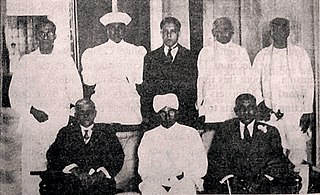
The Second Board of Ministers was the executive body opposite the State Council of Ceylon between 1936 and 1947. It was formed in March 1936 after the state council election and it ended in June 1947 with dissolution of the 2nd State Council. The Board of Ministers consisted of ten members, three ex-officio British officials and the chairmen of the State Council's seven executive committees. The Chief Secretary was the chairman of the Board of Ministers whilst the Leader of the State Council was its vice-chairman.

The 1st State Council of Ceylon was a meeting of the State Council of Ceylon, with the membership determined by the results of the 1931 state council election held between 13 and 20 June 1931. The parliament met for the first time on 7 July 1931 and was dissolved on 7 December 1935.
John Gladstone Rajakulendran was a Ceylon Tamil politician and teacher.
The chief secretary of Ceylon, was the chairman and one of three officers of state of the Board of Ministers of the State Council of Ceylon from 1932 to 1947. The post succeeded that of Colonial Secretary which was one of six offices that held a seat in the Executive Council of Ceylon until 1932.
Jaganathan Tyagaraja was a Ceylon Tamil barrister, politician and member of the State Council of Ceylon.
The Financial Secretary of Ceylon was an officer of the Ceylonese Government and member of the Board of Ministers. The Treasurer of Ceylon was one of six offices that held a seat in the Executive Council of Ceylon from 1809 to 1932. The post was replaced by the that of Financial Secretary in 1932, as one of three officers of state of the new Board of Ministers that replaced the Executive Council under recommendations of the Donoughmore Commission. The Financial Secretary was in turn replaced by the new office of the Minister of Finance in 1947 under the recommendations of the Soulbury Commission under the Ceylon Independence Act, 1947 and The Ceylon Orders in Council 1947.











